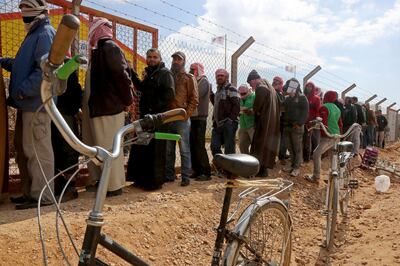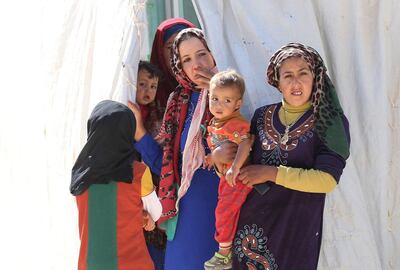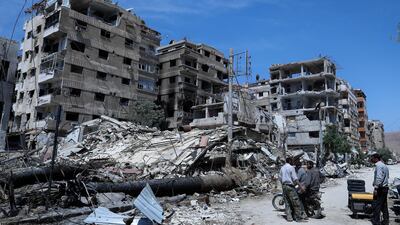“I don’t want to be here but I can’t go back to Syria.”
A frustrated Khalid Ali Alsayah articulates the dilemma faced by more than one million Syrians who sought refuge in Jordan from the civil war in their homeland.
Mr Alsayah used to be a policeman – a job he was proud of – in Damascus but was forced to flee the Syrian capital after the uprising against President Bashar Al Assad broke out in March 2011, when the people he used to serve started accusing him of siding with the government.
"People stopped seeing my job as a policeman as a positive thing. I wasn't with the government but nor was I against it. I felt threatened because I used to live in an area where the people were fighting against the authorities. People blamed me," Mr Alsayah, 40, told The National.
“I was shot at, my house was set alight, my motorbike was damaged. In the end, I left because I was afraid for my children’s safety.”
Mr Alsayah's house fire was caused by an electrical fault due to a water leakage.
He fled to Jordan with his family in 2012 and now lives in its capital Amman with his wife and five children. But survival has been difficult in a country with a struggling economy and few resources to spare for its refugee population.

“It’s so tough to get a job here as a Syrian and the pay is very bad,” Mr Alsayah says.
But returning home is a daunting prospect, even though the fighting has subsided in most of the country and the main border crossing between Amman and Damascus was reopened nearly a year ago. Most cities are badly damaged, militias still hold sway in some areas and returning males are at risk of being conscripted into the army or detained by suspicious state authorities.
“Some people hire lawyers to see if the government holds charges against them, but even if their record is clear there is still the threat from militia groups,” says Mr Alsayah. “Also, if you’re a man under 50 you’ll be arrested at the border and forced to enlist in the army, even if you’ve already done your service, like me.”
Some people are convinced to return by social media posts describing certain areas as safe and calm, but find this is not true when they arrive, he says.
Despite the risks, 153,000 of the estimated 1.3 million Syrian refugees in Jordan have returned home since the Nasib border crossing was reopened in October last year, according to the Jordanian Interior Ministry. They included 33,000 of the 670,000 refugees registered with the UN refugee agency, the ministry said on September 17.
Syrian citizens and refugees with passports can enter Jordan from Syria as long as they have approval from the Jordanian Ministry of Interior. Refugees living in Jordan without passports must secure an exit permit before they leave. Obtaining a passport in Syria is much cheaper than in Jordan, so those wishing to return to Jordan often organise a passport during their return trip to Syria.
When Mr Alsayah’s brother – who still lives in Syria – became sick three months ago, his father, who holds a passport, returned to Damascus.
“There was a shooting in a gas station so he came back because he didn’t feel safe. But he’s old, he wants to die in Syria, so he returned again two days ago. He 78, so he’s not afraid of anything anymore, but he travelled with $200 in his pocket and he left me a voice message saying the Syrian guards at the border took it off him so now he doesn’t have money to buy medication. He wishes he’d stayed in Jordan.”
About 75 per cent of Syrian refugees living in Jordan, Iraq, Lebanon and Turkey hope to return to Syria one day, according to a UNHCR survey published in March.
However, only about 6 per cent said they planned to return within the next 12 months. The decision to return was dependent on safety and security in Syria, job opportunities, as well as access to shelter and basic services, the survey found.

Fahad, a qualified electrician also from Damascus, returned to Syria in February to renew his passport, while seeking medical treatment and dental care because it is cheaper there. However, he has no plans of making a permanent move. He says several people he knows were never heard from again after they went back.
“I think it will take many years before it is truly safe to return to Syria,” he said.
The father of four came to Jordan in 2013 because he has relatives in the country and felt it was his family’s best option, but he has faced the same struggles as Mr Alsayah. “Jordanians just see us as a burden. I’m desperate to work but finding a job here is almost impossible,” he said.
“When work permits were launched through the partnership between the UNHCR and the government, I finally felt hopeful that I would be able to support my family. But not much has changed.
“We’re not living here; we’re barely surviving,” he says.
*The names of certain people have been changed to protect their privacy

